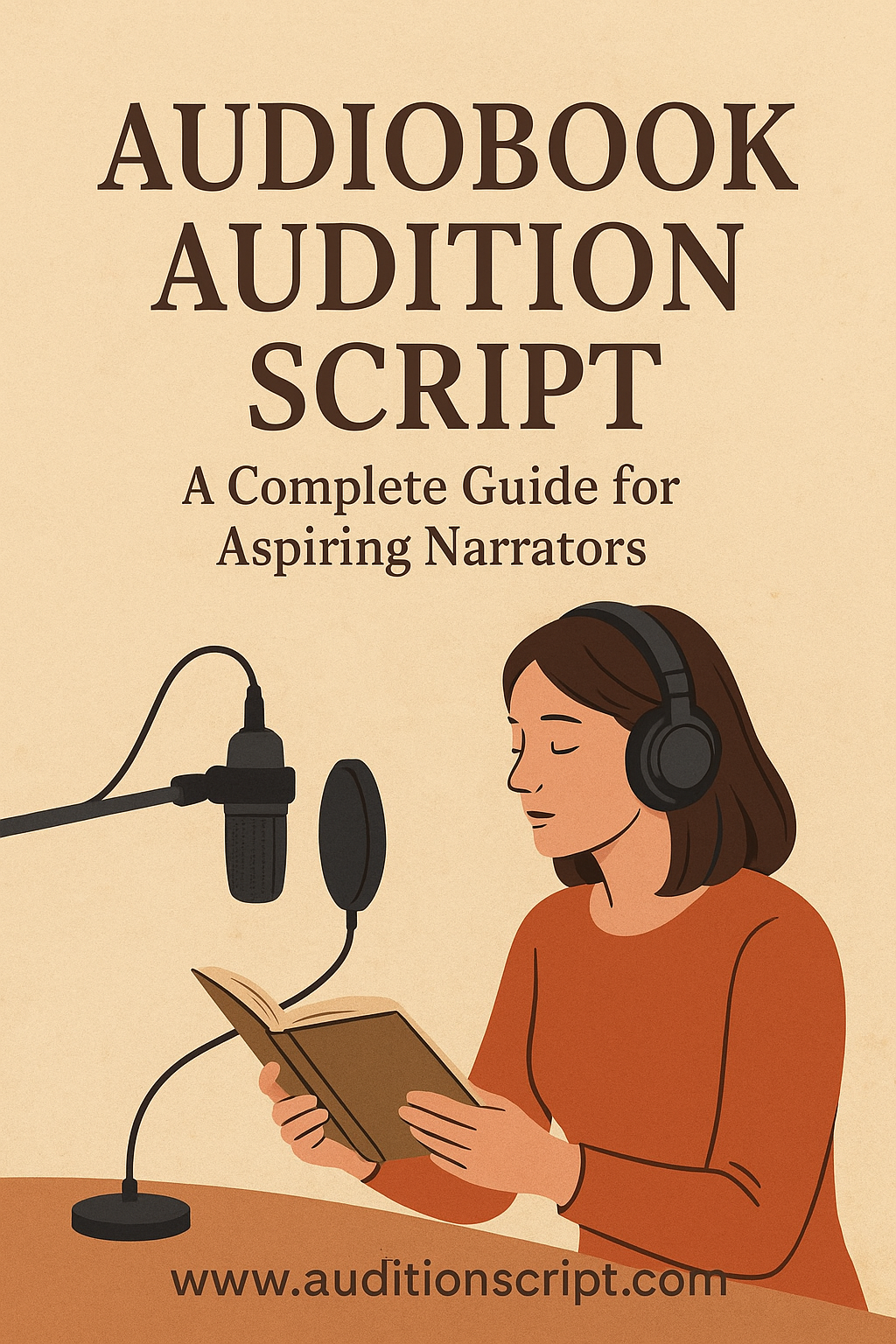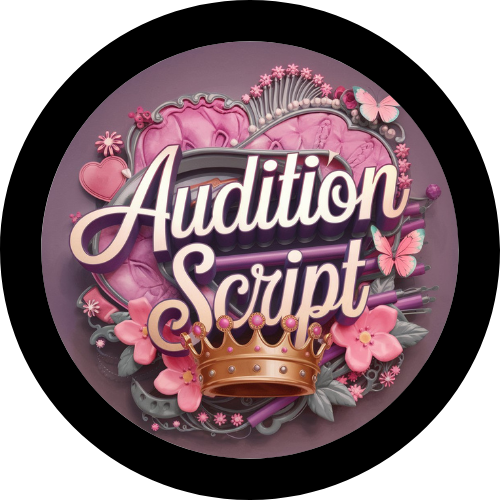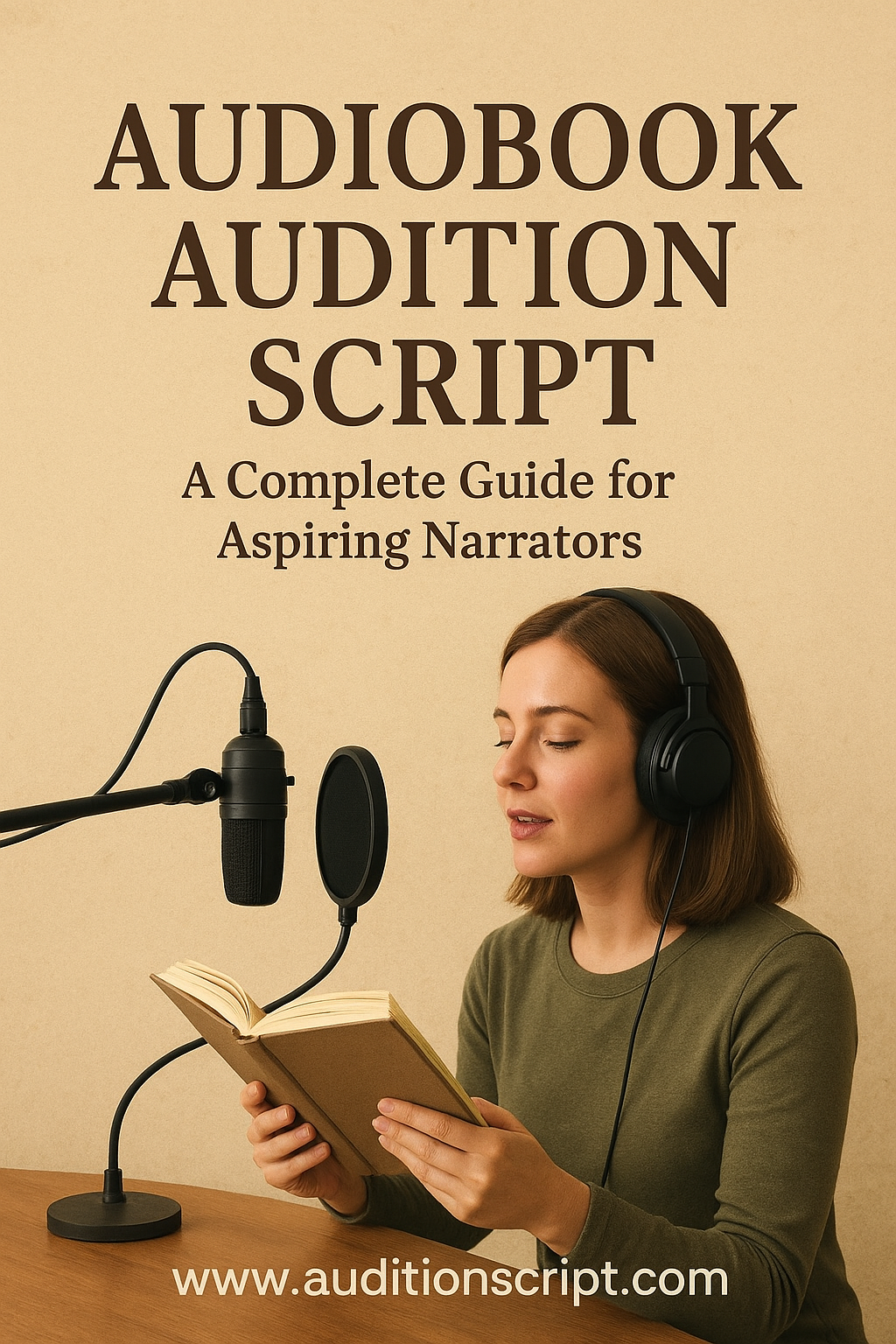Audiobook Audition Script: A Complete Guide for Aspiring Narrators
Breaking into the world of audiobook narration is both exciting and competitive. With the rise of platforms like Audible, Apple Books, and Scribd, the demand for skilled audiobook narrators has skyrocketed. But before you land your first gig, you’ll likely go through an audiobook audition process, where casting directors and publishers judge your ability to bring a story to life.
This guide will give you everything you need to know about audiobook audition scripts, along with original practice sets to help you prepare like a pro.

What is an Audiobook Audition Script?
An audiobook audition script is a short passage of text (usually 1–3 minutes of narration) that producers use to evaluate your skills. Unlike acting auditions, your physical appearance doesn’t matter—your voice, pacing, tone, and ability to convey emotion are what count.
Casting directors are listening for:
- Clarity & Diction – Is your speech crisp and easy to understand?
- Consistency – Can you maintain the same character voices and tone throughout?
- Emotional Depth – Do you connect with the story and convey its mood?
- Pacing – Do you read too fast, too slow, or just right?
How to Prepare for an Audiobook Audition
- Warm Up Your Voice – Gentle humming, tongue twisters, and breath control exercises can make a huge difference.
- Understand the Text – Don’t just read words. Understand the characters, emotions, and setting.
- Practice Multiple Styles – Audiobooks include fiction, nonfiction, fantasy, romance, and self-help. Each genre demands a different approach.
- Record Yourself – Listen back for pacing errors, awkward pauses, or mispronunciations.
- Edit Professionally – Producers want clean audio. Learn basic noise reduction and audio editing.
Practice Scripts for Audiobook Auditions
Here are original practice scripts you can use to rehearse. They are inspired by common audiobook genres but written fresh, so you won’t have copyright issues.
Practice Script 1 – Fiction (Middle Grade Adventure)
“Ethan tightened his grip on the lantern as the old wooden door creaked open. The shadows on the wall stretched like long fingers, reaching for him. He told himself he wasn’t afraid, but his racing heartbeat said otherwise. Somewhere in the darkness, a voice whispered his name.”
Tips: Focus on pacing and suspense. Make the listener curious about what comes next.
Practice Script 2 – Nonfiction (Motivational / Self-Help)
“Every great journey begins with a single step, but the step that matters most is the one you take today. Not tomorrow, not when the timing feels perfect—because perfection is an illusion. Success belongs to those who act, even when they feel unready.”
Tips: Use a calm, encouraging tone. Imagine speaking directly to one listener.
Practice Script 3 – Fantasy (Character Voices)
“The wizard’s eyes glowed with a fiery light. ‘You dare challenge me?’ he thundered.
In contrast, the small goblin squeaked, ‘I—I didn’t mean to! I only wanted the crystal for my village!’
The air crackled with tension, as if the entire forest held its breath.”
Tips: Practice switching between character voices while staying consistent.
Practice Script 4 – Romance (Warm & Emotional)
“She didn’t expect to see him again, not here, not tonight. The years melted away as he smiled, that same crooked smile she remembered from the summer they first met. Her heart whispered what her mind refused to say—she had never stopped loving him.”
Tips: Keep your tone soft, heartfelt, and believable.
Practice Script 5 – Mystery / Thriller
“The letter had no name, no address, only a single sentence: ‘I know what you did.’ Detective Rivera read it three times, each word pressing heavier on her chest. The city outside buzzed with life, but inside the room, silence screamed louder than anything else.”
Tips: Maintain a serious, gripping tone. Build suspense without rushing.
Final Thoughts
If you’re preparing for an audiobook audition, the key is practice and versatility. Casting directors want narrators who can adapt their voice to different genres, sustain character choices, and keep listeners engaged for hours.
Use the above practice scripts daily—record yourself, refine your delivery, and treat every read as if you’re already narrating a published book.
Remember: your voice is your instrument—train it, protect it, and let it tell stories that people will remember.
#audiobook #auditionscript, #audiobookpracticescripts, #howtoauditionforaudiobooks, #narratorauditionscriptexamples, #audiobookvoice #actingtips.

